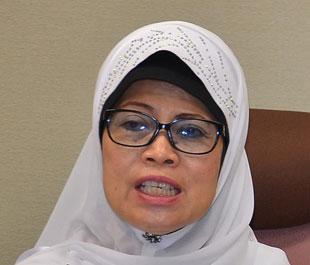
Datuk Fatimah Abdullah
KUCHING: The state government adheres to guidelines for the establishment and registration of Community Learning Centres (CLC) for children of Indonesian plantation workers throughout the state.
Welfare, Women and Family Development Minister Datuk Fatimah Abdullah said this in response to allegations by the opposition that the CLC threatens national security.
“The opposition aroused the establishment of CLC.
I emphasise that safety is its utmost priority for the establishment and registration of the CLC.
“To register the CLC, we need to emphasise several matters including the rules and procedures of the agencies involved in the two countries (Indonesia and Malaysia) in terms of safety, health, curriculum and teaching staff.
“The children are still small but they have the right to be educated, hence the establishment of the CLC that caters to children below 12 years old of plantation workers.
“Apart from health, we take measures for the safety of children studying at CLC,” she told a press conference held in conjunction with a courtesy call made by the United Nations Children’s Fund (UNICEF) representatives to her office on March 30.
To date, seven CLC were set up in farming areas in Miri followed by five in Bintulu and one in Serian.
Fatimah said the establishment of CLC was initiated by several plantation companies in the 20s and to date there are 13 CLCs in the state, seven in Miri, five in Bintulu, and one in Serian.
On health, Fatimah said the spread of ‘tuberculosis’ was unheard of yet, but the state government was alert and would ensure medical examinations were held in several places with CLC.
Fatimah discussed matters concerning Unicef and the state government among them marriages among children, teenage pregnancies, Indigenous People’s Conference, children profiling, child poverty, and education for children with special needs.
The Indigenous People’s Conference to be held on Sept 22 will witness more than 100 local and international experts
talk on their experiences and language curriculum in their countries.
The conference will focus on native pre-school children in Sarawak being taught their native language.
Sarawak has two schools that have been implementing a curriculum that emphasises teaching in native languages.
“The native languages, namely Bidayuh and Kelabit, are being taught in nurseries and kindergartens in Kampung Bunuk here and Taska Tawaq Raut in Bario. The books in native languages were created by local communities.
“It is being implemented out of the fear their native language will become extinct if not spoken, mainly caused by intermarriage. In these schools, students are taught their traditions and cultures from a young age,” she added.
Meanwhile, Unicef representative to Malaysia, Marianne Clark Hattingh said they were keen to investigate domestic abuse against children with focus on those living in plantations and from Indonesia apart from indigenous children.
“Although living in distant places with no proper access to communication, these children are entitled to their basic right to education. We want to do research on this group to find out what they went through in their lives and the direction we are leading them,” she said.
Marianne added that sometimes due to poverty, the children become victims of human trafficking and child labour or are groomed to become criminals.
Malaysia has organised many programmes to fight for children’s rights including their rights to health, education, social lives and empowerment.
Unicef also looks at cases of teenage pregnancies for these children’s rights to be fought to achieve developed nation status by 2020.
The press conference was attended by state Women and Family Department director Noriah Ahmad.
